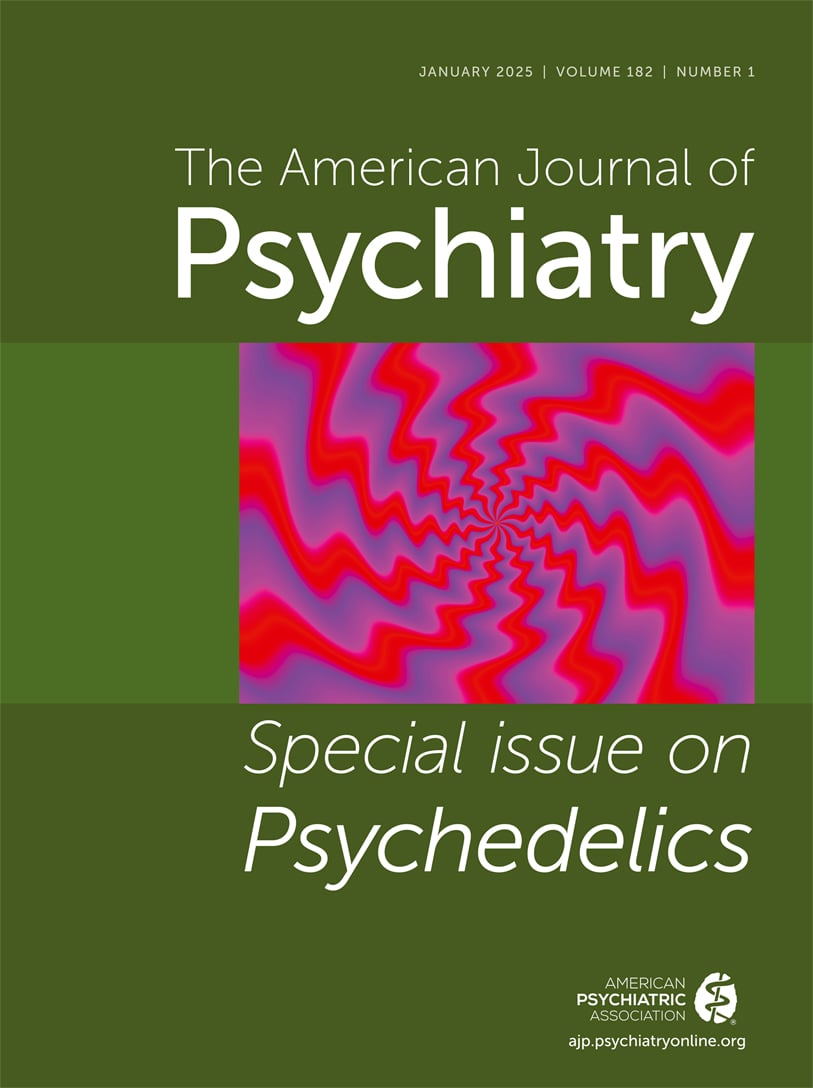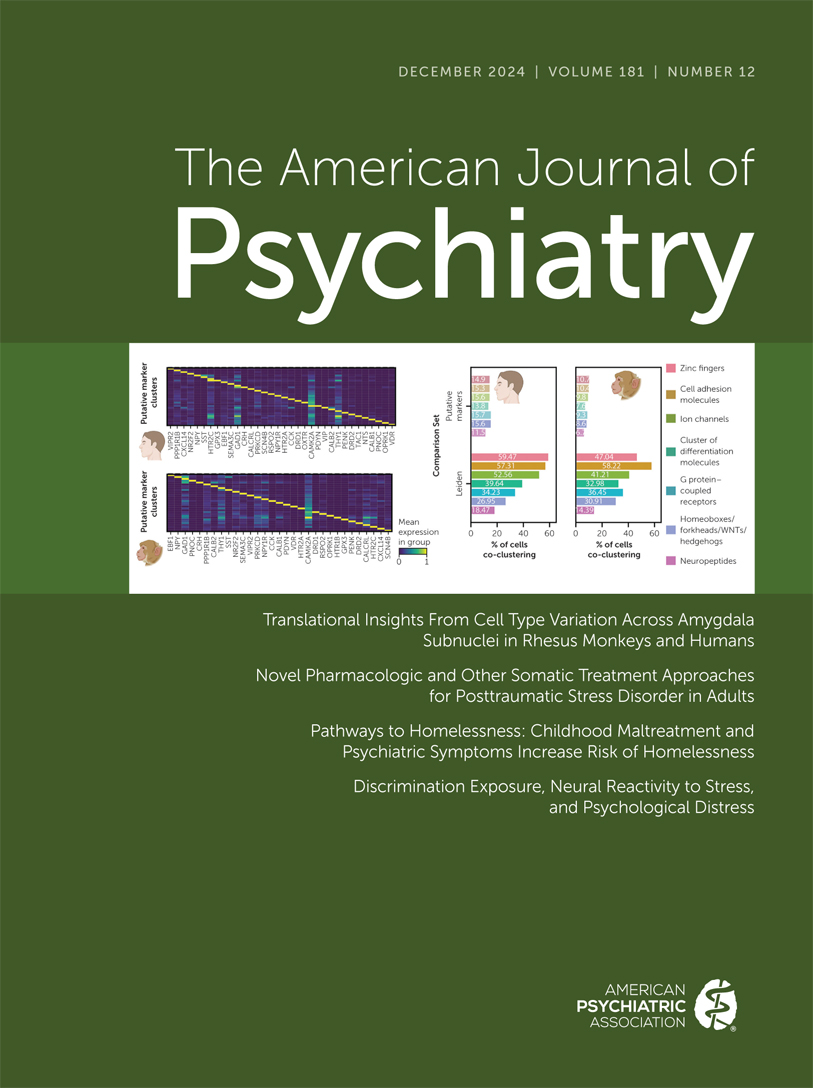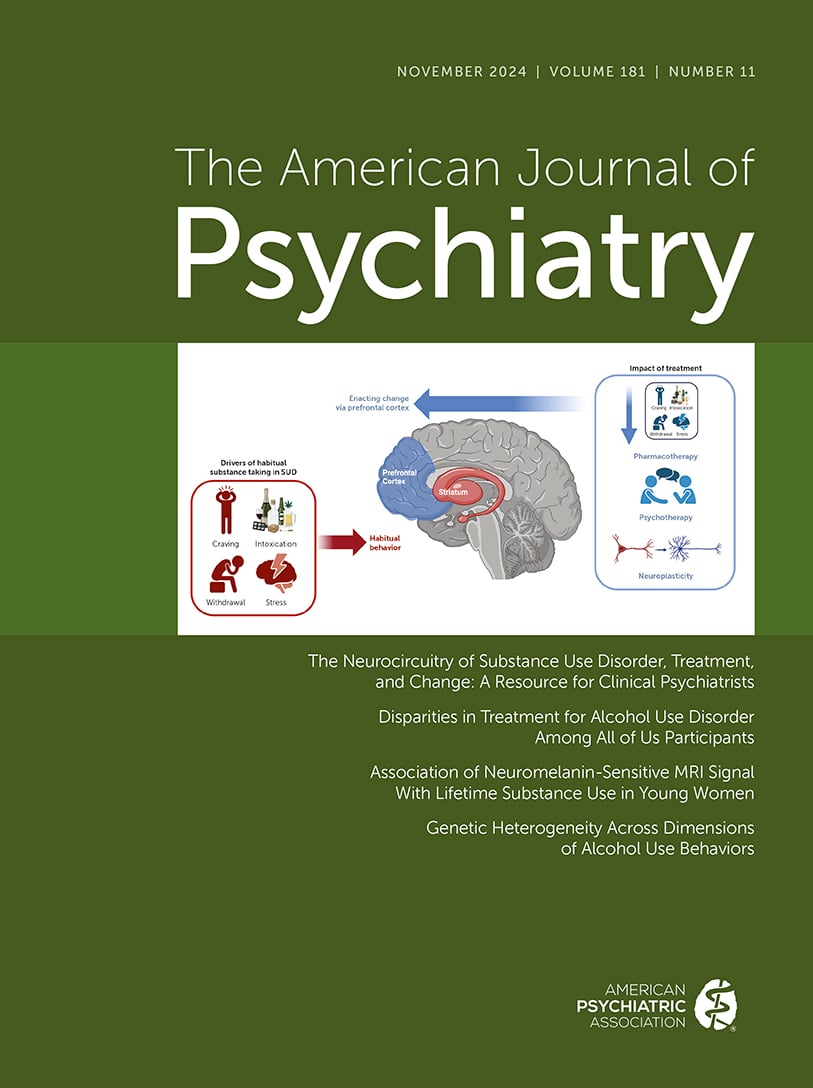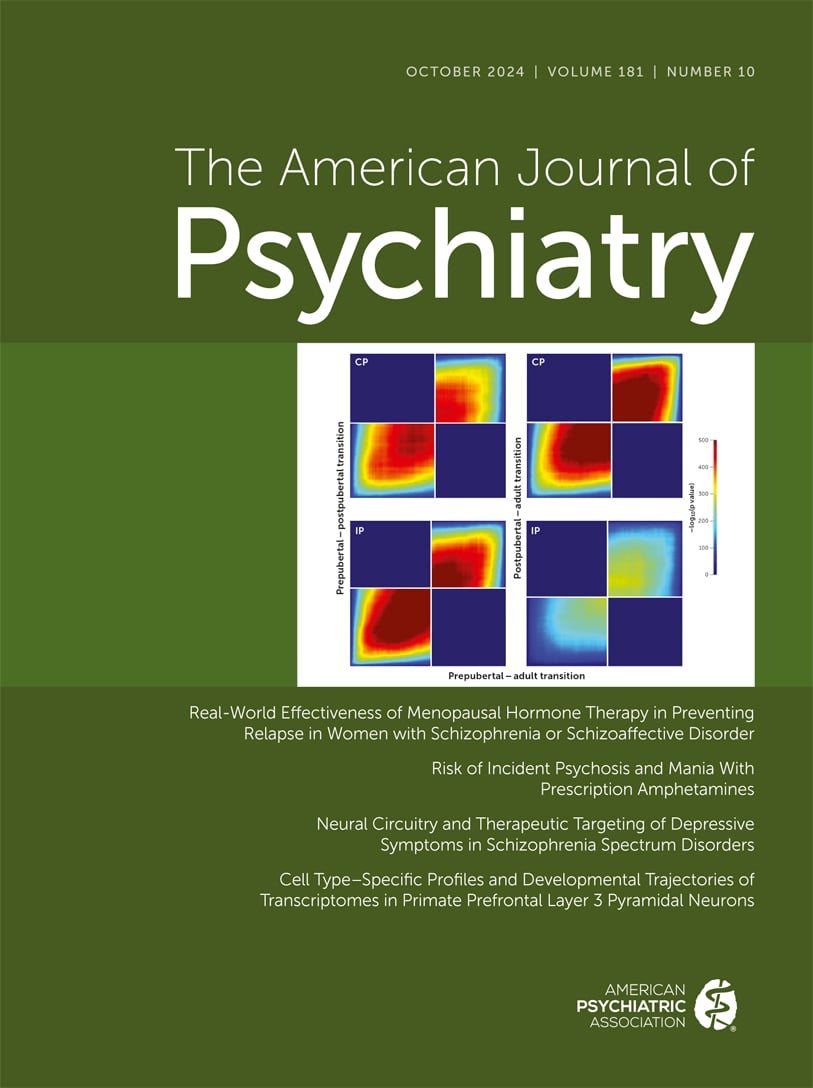American Journal of Psychiatry
- Volume 133
- Number 3
- March 1976
Publication date: 01 March 1976
Pages253–261Behavioral psychotherapy has become one of the definitive treatments available for the relief of psychiatric suffering. Although hardly a panacea for all ills, the behavioral approach is the treatment of choice for certain selected problems. Behavioral ...
https://doi.org/10.1176/ajp.133.3.253Publication date: 01 March 1976
Pages262–265The author presents three case reports of individuals with personality disorder, none of whom demonstrated significant ability for transitional relatedness before therapy. In therapy, he conceptualized for the two adult patients the importance of their ...
https://doi.org/10.1176/ajp.133.3.262Publication date: 01 March 1976
Pages266–270The term "psychosurgery" encompasses a wide variety of different neurosurgical procedures applied in the treatment of behavioral and psychiatric disorders. Arguments about the effectiveness and ethicality of psychosurgery are often based on studies using ...
https://doi.org/10.1176/ajp.133.3.266Publication date: 01 March 1976
Pages271–273The author studied the services provided for the elderly at eight community mental health centers. He describes discrimination against the elderly, the reasons why relatively few elderly persons seek care, and innovations in treatment. He discovered that ...
https://doi.org/10.1176/ajp.133.3.271Publication date: 01 March 1976
Pages274–278The author describes her experiences with two all-female psychotherapy groups, comparing these groups with both mixed-sex and consciousness- raising groups. Problems included a tendency of group members to drop out when dependency on the group became too ...
https://doi.org/10.1176/ajp.133.3.274Publication date: 01 March 1976
Pages279–283The author collected completed questionnaires from 52 psychiatrists who had failed to pass the examinations of the American Board of Psychiatry and Neurology (ABPN) on their first try. He quotes from the responses of 6 of these psychiatrists, showing the ...
https://doi.org/10.1176/ajp.133.3.279Publication date: 01 March 1976
Pages284–289The author evaluated the charts of 115 chronic schizophrenic patients who regularly attended a follow-up group to determine whether changes in long-standing medication regimens produced an increased dropout rate, decreased attendance, or psychotic ...
https://doi.org/10.1176/ajp.133.3.284Publication date: 01 March 1976
Pages290–294Five-hour oral glucose tolerance tests (GTTs) differentiated 30 volunteer patients who considered themselves hypoglycemic into three major groups: those who had reactive hypoglycemia, those who were normal, and those who had diabetes. Clinical psychiatric ...
https://doi.org/10.1176/ajp.133.3.290Publication date: 01 March 1976
Pages295–299Psychiatric evaluation teams used observations of family interaction and psychoanalytically oriented individual interviews to study the psychological aftereffects of the 1972 Buffalo Creek disaster, a tidal wave of sludge and black water released by the ...
https://doi.org/10.1176/ajp.133.3.295Publication date: 01 March 1976
Pages300–301The litigation initiated by the 625 survivors of the Buffalo Creek flood who refused to settle with the coal company claims office was a landmark case. For the first time, individuals who were not present at the scene of a disaster were allowed to recover ...
https://doi.org/10.1176/ajp.133.3.300Publication date: 01 March 1976
Pages302–305The survivors of the Buffalo Creek disaster suffered both individual and collective trauma, the latter being reflected in their loss of communality. Human relationships in this community had been derived from traditional bonds of kinship and ...
https://doi.org/10.1176/ajp.133.3.302Article
Publication date: 01 March 1976
Pages306–312Most of the 224 children who were survivor-plaintiffs of the Buffalo Creek disaster were emotionally impaired by their experiences. The major factors contributing to this impairment were the child's developmental level at the time of the flood, his ...
https://doi.org/10.1176/ajp.133.3.306Publication date: 01 March 1976
Pages313–316The specific contribution of the psychiatrist to the team study of the human disaster at Buffalo Creek focuses on the course of psychic trauma. The initial violent intrusion by the flood waters was followed by a second phase of the traumatic cycle, the ...
https://doi.org/10.1176/ajp.133.3.313Publication date: 01 March 1976
Pages317–320The authors describe severe psychiatric and neurological sequelae in a patient who suffered carbon monoxide poisoning as a result of a suicide attempt. A review of the literature revealed that 15 to 40% of survivors of carbon monoxide poisoning develop ...
https://doi.org/10.1176/ajp.133.3.317Publication date: 01 March 1976
Pages321–323Seizure disorders may present with signs and symptoms that are usually associated with psychiatric disorders. Physicians must be alert to this possibility; they should use careful history taking in conjunction with EEGs to avoid misdiagnosing certain ...
https://doi.org/10.1176/ajp.133.3.321Publication date: 01 March 1976
Pages323–326The authors found lower platelet monoamine oxidase (MAO) activity in 13 unmedicated chronic schizophrenic male patients in comparison to 13 mentally normal control male subjects--a finding that agrees with previous studies showing MAO activity to be low ...
https://doi.org/10.1176/ajp.133.3.323Publication date: 01 March 1976
Pages326–328The authors describe their experiences as consultation-liaison psychiatrists in two general teaching hospitals. Current medical house staff members appear to be more aware of the importance of psychosocial issues in patient care than were interns and ...
https://doi.org/10.1176/ajp.133.3.326Publication date: 01 March 1976
Pages328–331The job expectations of 35 incoming chief residents were tested by questionnaire when they attended a weekend workshop on leadership and were reexamined after they has had six months' experience on their jobs. Such personal qualities as a sense of humor ...
https://doi.org/10.1176/ajp.133.3.328Publication date: 01 March 1976
Pages331–334Haloperidol was compared with placebo in the treatment of 8 young adult stutterers in a double-blind crossover study involving 6 sequential observations over periods of 6 or 12 weeks. The drug was found to have a significant effect on the percentage of ...
https://doi.org/10.1176/ajp.133.3.331Publication date: 01 March 1976
Pages334–340The authors present clinical and case material on two male triplets with aberrant gender identity. Their findings coincide with those of the few family studies reported in which there were two or more transsexual members; they also reveal patterns ...
https://doi.org/10.1176/ajp.133.3.334Publication date: 01 March 1976
Pages337–340Of 802 voluntary patients admitted to the detoxification unit of a comprehensive treatment system, 69% completed detoxification but only 9.6% of thest patients sought long-term treatment. The demographic profile of detoxification patients differed ...
https://doi.org/10.1176/ajp.133.3.337Publication date: 01 March 1976
Pages340–341The authors' questionnaire survey of 147 community mental health centers revealed that 36 (24%) were using problem-oriented medical records (POMR), 34 (23%) planned to use them, 23 (16%) were uncertain and 54 (37%) had no considered using them. According ...
https://doi.org/10.1176/ajp.133.3.340Article
Publication date: 01 March 1976
Pages361–363The 129th annual meeting of the American Psychiatric Association will be held in Miami, Fla., May 10-14, 1976. The information here is what was available as of mid-January 1976. The official program book containing the scientific, business, and social ...
https://doi.org/10.1176/ajp.133.3.361Past Issues
View Issues Archive
Vol. 182 | No. 1

Vol. 181 | No. 12

Vol. 181 | No. 11
